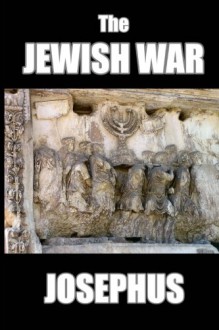The blood-drenched, firsthand account of the 66–70 AD war between Rome and the Jews, as told by a Jewish rebel fighter turncoat who ended up working for the Romans. Starting with an account of the occupation of Judea by the Macedonian Seleucids and the Jewish rebellion against those rulers, the...
show more
The blood-drenched, firsthand account of the 66–70 AD war between Rome and the Jews, as told by a Jewish rebel fighter turncoat who ended up working for the Romans. Starting with an account of the occupation of Judea by the Macedonian Seleucids and the Jewish rebellion against those rulers, the author reveals how incessant internal chaos, infighting and instability finally led to the Jews asking for incorporation into the Roman Empire. Mark Antony and Julius Caesar then appointed their favourite Jew, Herod, as king of Judea, but this brought only a temporary peace. Widespread Jewish sedition caused further outbreaks of violence, and the Roman governor of the province of Syria, Varus, was ordered to march into Jerusalem to crush a rebellion which broke out after Herod’s death in 4 AD. This marked the first major Roman incursion into Judea, and from then on, Josephus relates, the spiral of violence increased year upon year until open war between Rome and the Jews broke out in 66 AD. The incredible campaign waged by the Roman legions, first under Vespasian, and then under his son Titus, across Judea are recounted in detail, as are the atrocities committed by the Jewish nationalist terrorist organisation, the Sicarii, in Jerusalem and elsewhere. Included in this fast-moving drama are descriptions of the lengthy siege of Jerusalem by Roman forces; the shocking massacres committed by the Jews against Romans; the incredible extent of Jewish factionalism, infighting and mutual terrorism and plunder against their own people (which served to greatly aid the Roman military effort); the anti-Jewish uprisings which occurred in all the cities in which sizeable Jewish populations lived (Damascus, Scythopolis, Ascalon, Ptolemais, Alexandria and Tyre, among many others); the appearance of the fanatic Jewish faction known as the Zealots, which sparked off a renewed bout of internecine Jewish terror and massacres; the capture of Jerusalem by Titus; the razing of the city and the temple and Titus’s famous victory parade through Rome with the spoils of war. Finally, the book recounts the last mopping up operations against Jewish terrorist Sciarri: how the Legate Lucilius Bassus was ordered to destroy the fortress Machaerus, and Flavius Silva, the new governor of Judaea, was charged with conquering the last remaining Zealot stronghold, Masada; and it ends with the account of the Sicarii sedition and terrorist campaigns—which included frightful massacres—in Alexandria and Cyrene, and of their eventual suppression and destruction by the Romans.
show less

